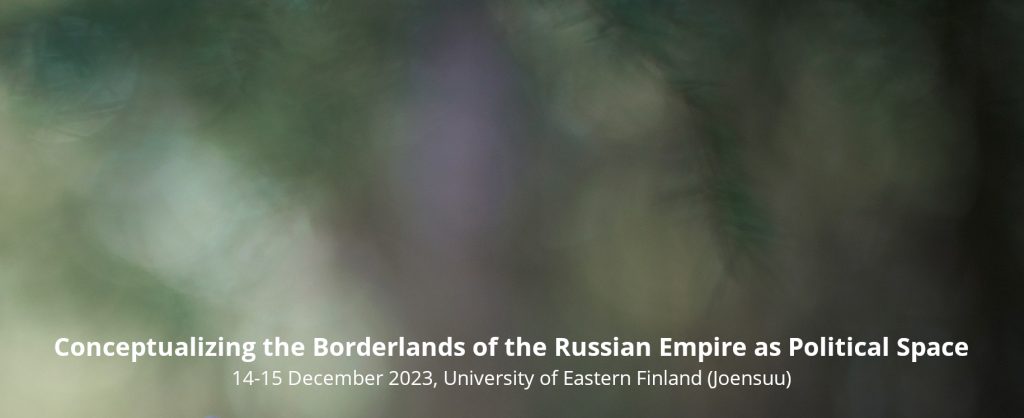Programme

The conference consists of two full days on 14-15 December 2023. All sessions are held in the lecture hall M102 in the Metria building, Yliopistokatu 7, Joensuu.
Printable version of the programme here.
Abstracts here.
For anyone arriving to Joensuu on Wednesday, the VERA Centre for Russian and Border Studies organizes a Bite-size seminar by Postdoctoral Researcher Alexander Osipov. The title of Dr Osipov’s presentation is “Decolonizing the Steppe: From the Golden Horde to the Sacred Geography of Kazakhstan.” 13 December 2023 at 15.15-16.30 in lecture room AU104-AU105, Karelian Institute (Yliopistokatu 2, Joensuu). Welcome!
THURSDAY, 14 December
8:45–9:00 Opening words, Ilkka Liikanen
9:00–10:00 Keynote lecture, Prof. Stefan Berger (Ruhr-Universität Bochum): Borderlands of Nineteenth Century European Contiguous Empires in Comparative Perspective
10:00–10.15 Coffee
10:15–12:15 Session 1: Defining space on the early modern borderlands, Chair: Marja Jalava
- Kimmo Katajala (University of Eastern Finland): Finland as a Political Space by the Russian Border in the 16th and 17th Centuries
Kasper Kepsu (Åbo Akademi): Ingria and Kexholm County as Borderlands in the 17th Century- Ricarda Vulpius (Westfälische Wilhelms-Universität Münster): Local Forms of Representation and Concept of Autonomy in the Southeastern Frontier of the Tsarist Empire in the 18th Century
- Jenni Merovuo (University of Eastern Finland): Local agency and space on the Russo-Swedish borderland in the late 18th century
12:15–13:15 Lunch
13:15–15:15 Session 2: Borders, power, and the First World War, Chair: Wiktor Marzec
- Ilya Solomeshch (European Humanities University): “To hell with all of them!”. Patterns of imperial rhetoric in decision-making on the Finnish question during WWI
- Tuomas Teuho (Tampere University): Furthering Russian imperial unity through military presence – the case of the town of Hämeenlinna in 1900–1917
- Tamara Polyakova (University of Eastern Finland): Looking West. The Russo-Finnish Border in Civil War-era and Early Soviet Imagination, 1918–1924
- Thomas Rettig (University of Greifswald): (Re)envisioning the Empire from a Western Borderland. The West Russian Volunteer Army in Courland 1919
15:15–15:30 Coffee
15:30–17:30 Session 3: Interpretations and uses of history, Chair: Jussi Kurunmäki
- Marja Jalava (Tampere University): A State, a Province, or Both? Finnish Historiography on the Status of the Grand Duchy of Finland within the Russian Empire
- Kati Parppei (University of Eastern Finland): Nikolay Danilevsky’s (1822–85) ideas and Russian imperialism then and now
Olga Dorokhina (Caucasus International University): Georgia as the Borderland of the Russian Empire: how the past attempts to influence the future- Luuk Winkelmolen (Radboud University Nijmegen, co-authors: Paschalina Garidou & Henk van Houtum, Radboud University Nijmegen): The past as a geopolitical weapon: How Putin is anachronistically instrumentalising Russian history to justify the invasion in today’s Ukraine
19:00 Conference dinner: Ravintola Filipof (Torikatu 10)
FRIDAY, 15 December
8:30–10:30 9:00-10.30 Session 4: Boundary-building in Russia, Chair: Kati Parppei
- Jukka Korpela (University of Eastern Finland): The Frontier against sin. Extensions of Holy Russia
Olexandr Kravchuk (University of Bristol): The perception and conceptualization of borders by imperial bureaucrats within the Northern Shore of the Black Sea region and Crimea in the late 18th and first half of the 19th century- Piotr Kuligowski (Polish Academy of Sciences): Phantom pains: The concept of borders in Polish parliamentary discourse, 1815–48
- Raymond (JR) Drause (University of Eastern Finland): Decembrists and Semeiskie: Exiled Nobles and Old Believers in the Transbaikal Region
10:30–10:45 Coffee
10:45–12:15 Session 5: Tensions between borderlands and the Empire, Chair: Anton Kotenko
- Justyna Straczuk (Polish Academy of Sciences): “Lords’ School and Peasant Children”. Rural education as an instrument of Russian and Polish expansion in the Polesie region at the beginning of the XX century
- Takehiro Okabe (University of Helsinki): The Kalevala and Pan-Finnism between the Imperial and National in the Late Russian Empire
- Jeremy Smith (University of Eastern Finland): The Place of Nationality and Rights in the Russian Empire and the Soviet Union
12:15–13:15 Lunch
13:15–15:15 Session 6: Conceptualizing connectivity, Chair: Alina Kuusisto
- Ulrike von Hirschhausen (University of Rostock): Re-Conceptualizing border concepts?
- Anton Kotenko (University of Helsinki, co-author: Catherine Gibson, University of Tartu): Imperial Threads: Towards a New Spatial History of the Romanov Empire
- Jussi Kurunmäki (University of Jyväskylä), Ilkka Liikanen (University of Eastern Finland) & Jani Marjanen (University of Helsinki): Autonomy, Sovereignty and Independence in the Conceptualization of Finland’s Position within the Russian Empire
- Wiktor Marzec (University of Warsaw): The spatial imaginations and solidarities of Polish socialists at the verge of revolution 1905–1915
15:15–15:30 Coffee
15:30–16:30 Keynote lecture (Online), Prof. Diana Mishkova (Centre for Advanced Study in Sofia): “A symbolic borderland: ‘expert knowledge’ and the conceptualizations of the Balkans in late-eighteenth to early-twentieth century Russia”
16:30 Concluding remarks, Chair: Jani Marjanen
Updated 13 December 2023.